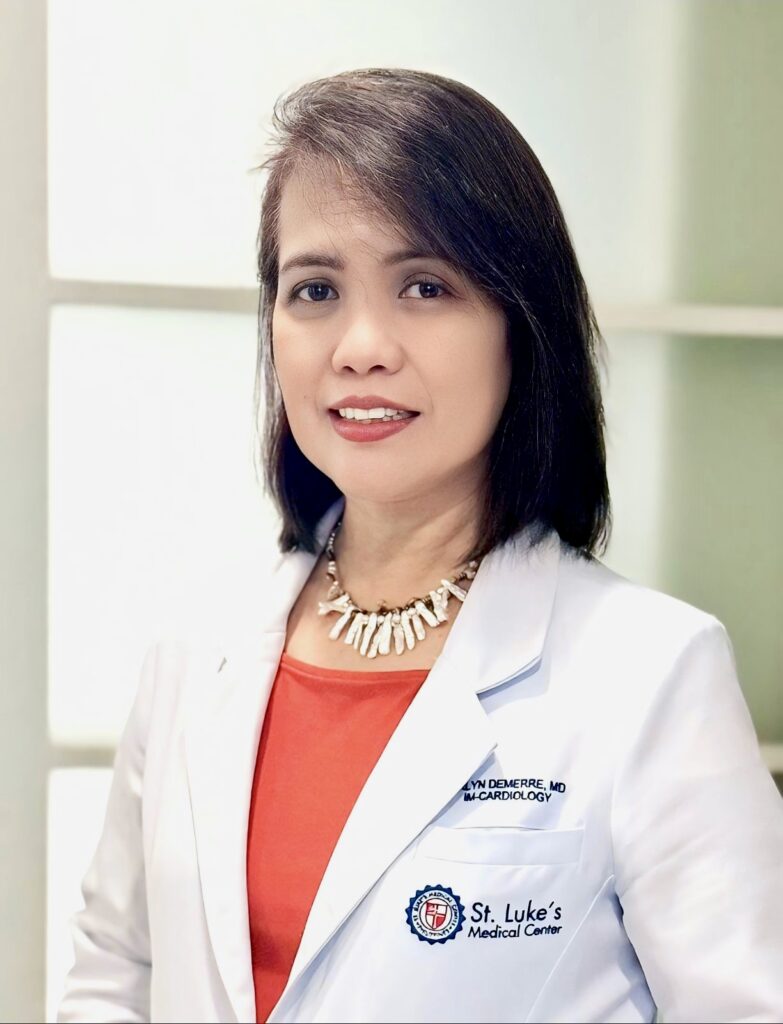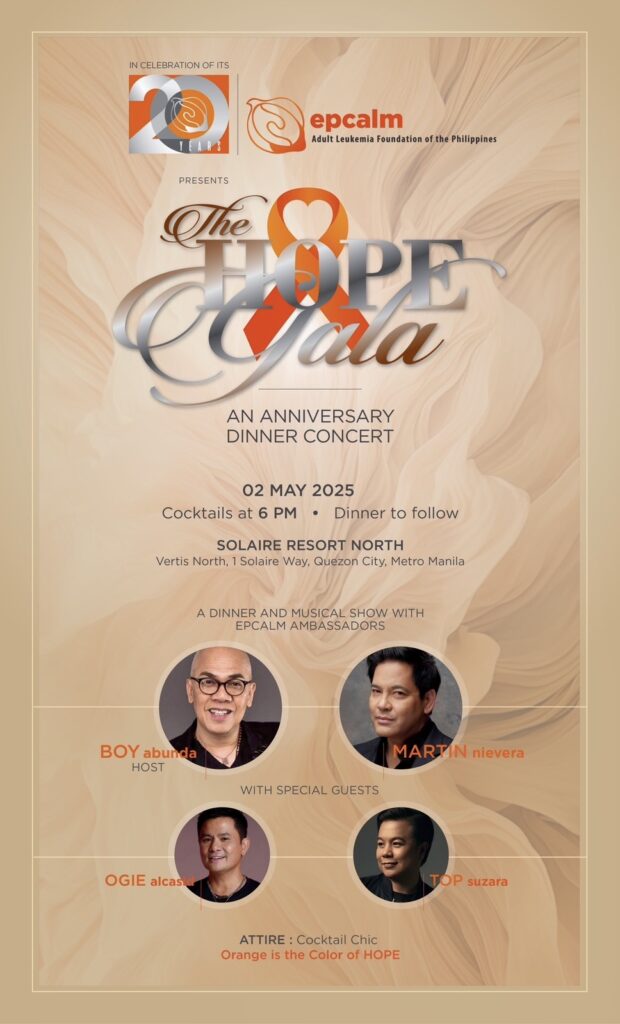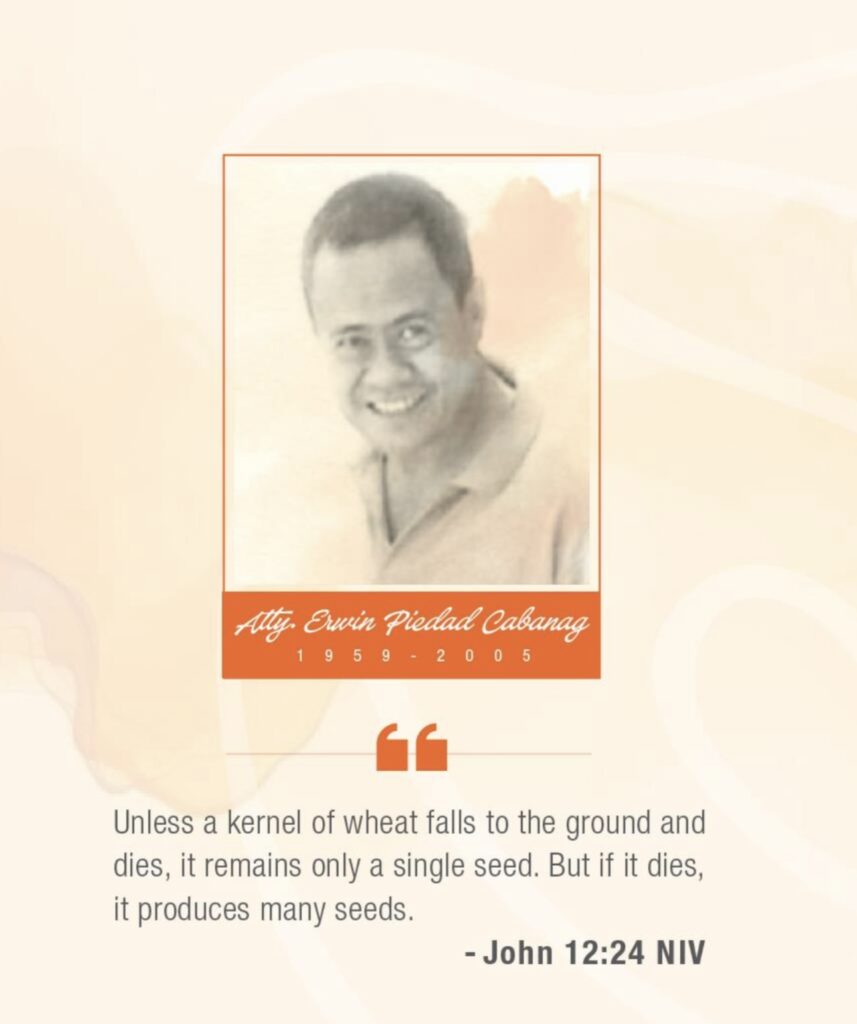Established in 2005 after the death of lawyer Erwin Piedad Cabanag from acute myelogenous leukemia, EPCALM aims to provide those afflicted with adult leukemia with hope and healing through its spiritual, medical and financial ministries. Its benefit dinner show on May 2 at Solaire Resort North, featuring Martin Nievera, Regine Velasquez and Ogie Alcasid, aims to raise P7 million to help fund the non-profit organization’s future programs and beneficiaries.
By ALEX Y. VERGARA
Some may find it strange that Dr. Erlyn Demerre, a specialist in internal medicine, adult cardiology and echocardiography at St. Luke’s Medical Center, heads a foundation whose main mandate is to address adult leukemia through its three service arms: spiritual, medical and financial. Stranger still is the foundation’s name: EPCALM.
But to Demerre, who founded EPCALM 20 years ago, everything happens for a reason. And for her, it was personal, as it involved her late brother lawyer Erwin Piedad Cabanag, EPC for short, and the adult leukemia ministry (ALM) his sister founded in the wake of his death after a two-year battle with the disease.
Two decades on, EPCALM is celebrating its 20th anniversary with a benefit dinner show on May 2 at Solaire Resort North. Hosted by Boy Abunda, the dinner show, dubbed as The Hope Gala, will feature the foundation’s leading goodwill ambassador Martin Nievera and fellow EPCALM advocates Ogie Alcasid, Regine Velasquez and Top Suzara. Organizers led by Demerre aim to raise up to P7 million during the gala event.

Demerre and her family weren’t exactly poor, but the lack of medical facilities in the Philippines back then when Cabanag was first diagnosed with acute myelogenous leukemia required that they seek help for him abroad, particularly in the United States.
Cabanag went into remission, but not after undergoing high doses of chemotherapy in Manila, which later resulted in a fungal ball in his lungs that needed to be removed. Called lobectomy, the procedure invariably took away part of his lungs. When the family was told that the odds of him getting a life-extending bone marrow transplant in the Philippines were slim, they all decided to seek options in the United States for his treatment.
“The challenge was getting a US visa for him,” says Demerre. “He was initially denied a visa because the consul at the embassy didn’t believe he was sick. Even when he had all the documents from the US National Institute of Health in Bethesda, Maryland confirming his treatment schedules and protocols, they disregarded them and presumed he wouldn’t return to the Philippines.”

After nearly two years, the US Embassy in Manila finally heeded their appeal, granting a visitor visa to Cabanag. By then, however, his leukemia had recurred. From the family’s hometown in Dumaguete, he was airlifted to St. Luke’s Medical Center after a major relapse.
“We lost time. Valuable time. A few days before our set departure to the US, he succumbed,” Demerre shares. Instead of going into the despair, the entire family channeled their grief into something positive, eventually giving birth to EPCALM, which, more than a non-profit organization, Demerre considers a “ministry.”
“The words of our Lord Jesus Christ in John 12: 24 inspired us to build EPCALM,” she says. ‘“Very truly I tell you, unless a kernel of wheat falls to the ground and dies, it remains only a single seed. But if it dies, it produces many seeds. Anyone who loves their life will lose it, while anyone who hates their life in this world will keep it for eternal life.”’ Erwin fell to the ground, and now EPCALM has produced many seeds. Many have joined the mission to help the sick, the grieving and the dying.”
The ministry’s reason for being, she continues, is to be a beacon of hope by bringing the light of Christ “into the darkness caused by leukemia.” On a more practical note, the non-profit organization’s target beneficiaries are every adult journeying through leukemia regardless of race, gender, or creed.
Adult leukemia encompasses both acute and chronic forms of the disease. Before EPCALM was established, says Demerre, there was no foundation addressing the needs of people with adult leukemia. The foundation decided to focus on this sector since there is already a foundation for children suffering from the disease.
“We believe that adults with leukemia also need the support and the chance at life,” she adds.
Commonly referred to as “cancer of the blood,” one of leukemia’s most common symptoms relate to abnormalities in the blood and how it reproduces itself. These, in turn, can result to pallor and a feeling of weakness when red blood cells are low, or a susceptibility to bruising and bleeding whenever the person’s platelet counts are down.
A person suffering from leukemia is also prone to infection, especially when his or her white blood cells, which primarily fights off infections, are low or extremely high.
“Hence, leukemia can have nonspecific symptoms like tiredness,” says Demerre. “Check up with your doctor is key and a complete blood count will be ordered to either rule out leukemia or for the patient to undergo further tests. The attending doctor may require a bone marrow biopsy when appropriate to confirm the diagnosis.”
Quoting from the Global Cancer Observatory 2022 report conducted by the World Health Organization’s International Agency for Research on Cancer, globally, leukemia ranks 13th in terms of new cancer cases and is the 10th leading cause of cancer-related deaths, Demerre informs.
In the Philippines, there were 7,026 new cases of leukemia reported in 2022, making it the 8th most common cause of cancer among Filipinos. Unfortunately, mortality rate is also high, as 5,416 patients lost their lives to the disease during that year, making leukemia the fifth leading cause of cancer-related deaths in the country.
“The prevalence of leukemia in the Philippines is influenced by a combination of environmental factors, genetic predispositions, and challenges within the healthcare system,” says Demerre. “Based on our experience at EPCALM, the duration of our journey with patients can vary considerably. It may last anywhere from a single day to several days, weeks, months, or even years, depending on each patient’s individual health condition at the time we contact them.”
But, as Demerre further attests based on her work on the ground with EPCALM, contracting leukemia is not an automatic death sentence. Although the survival rate in the Philippines is still low, Acute Myeloid Leukemia, Acute Lymphoblastic Leukemia and their variants are curable.
Since 2008, EPCALM has assisted 286 adults with acute leukemia. Of that number, 16 survived, resulting in a survival rate of 5.6 percent. This is slightly higher than the 5.2 percent recorded in Metro Manila in 2015, says Demerre, but significantly lower than the 48.4 percent recorded in the US during the same period.
“For chronic leukemias, including Chronic Myeloid Leukemia and Chronic Lymphocytic Leukemia, along with their variants, the survival rate for adult patients is high with regular treatments and monitoring,” she adds.
There have been no specific studies as to why the survival rate among those suffering from acute cases of leukemia is significantly low in the Philippines compared to the US, but a likely cause would be the prohibitive cost of managing the disease.
It could run up to thousands, even millions of pesos, depending on the number of chemotherapy sessions required for the patient to achieve remission. And that doesn’t include a stem cell transplant, which could set back the patient and his or her family by another several million pesos.
“Although EPCALM may not have all the resources to meet every patient’s needs, we encourage each patient to trust in God, who can provide for them. And with our network of partners and linkages, we provide various services and assistance to our patients and their families,” says Demerre.
For her and her collaborators, God is the still “the hope, the healer and the provider.” EPCALM merely functions as a vehicle through which patients afflicted with leukemia experience God’s love, faithfulness and mercy.
For ticket inquiries, you may call the EPCALM OFFICE at (02) 8727-5012; 0919-9556149; and 0905-9289896







